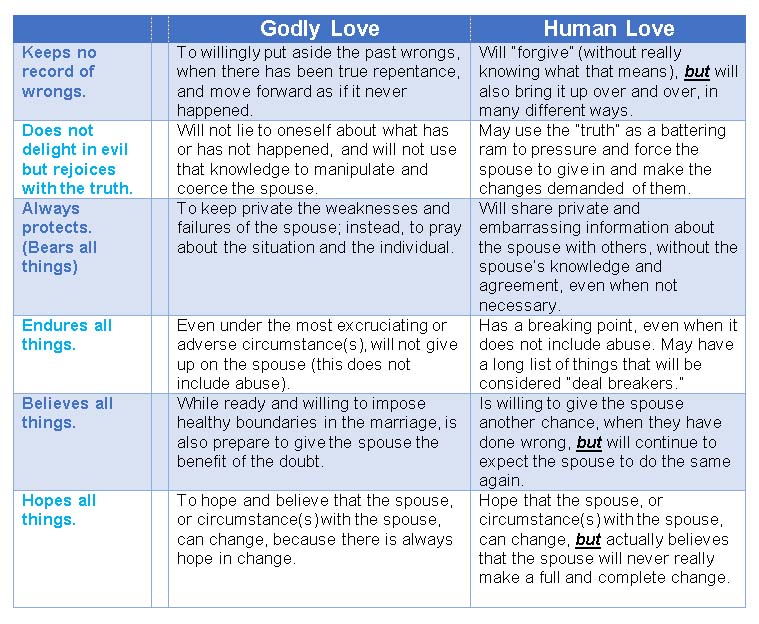As a counselor, I have worked with many couples in my 28 years in this ministry. One thing I have learned that is the source of many conflicts between them is the mistaken idea of what they believe love means. When someone uses the word “love,” they are actually saying many other things. Let’s look at a list of the things the word could mean to different people:
- I want you in my life.
- I need you in my life.
- I want you to be mine.
- I want you to be with me alone.
- I want you to be the father/mother of my children.
- I want to grow old with you.
- I don’t want someone else to have you.
- I don’t want someone else to take you away from me.
- You make me feel good about myself.
- I am happy when you are around.
- I can’t live without you.
- I don’t want to live without you.
- When you are not with me I feel sad or angry.
What is the common denominator in all of the above statements? Yes, it is all about the speaker (I, me, my, and mine). Notice none of the statement say, “I want to do what is in your best interest, even if you reject me.” Human love is, by its nature, selfish. This is why two persons will start off liking each other in a relationship, and can end up hating each other in the end. They may claim to have loved each other at some time, but the “love” they had was a human one, flawed and selfish. The truth is that many couples do not really know true love.
Their love is more easily defined in the term “fifty-fifty,” where each are expected to do their part. The problem is that too often they don’t know what their part is, and secondly, they are only doing their “part” of it. Human love can better be understood this way: “I will try to do my part (whatever it is that I think or believe I am supposed to do), but I will expect you to do the right things all the time (whatever I think or believe you are supposed to do). The truth is that many couples just do not know what love really is, and therefore have unrealistic expectations as to what their partners are supposed to be doing, much less themselves.
As a counselor you run into these situations constantly. One of the pair will argue that the other is failing in their responsibilities, but will, at the same time, overlook their own indiscretions when it comes to marital responsibilities. Each will be adamant that they understand what love means, but will also spout selfish expectations which place the greater responsibility on their partner to fulfill their part (whatever that may be). As well, each will use the word “love” in inappropriate and confusing ways. For example, a client of mine, a woman, told me that she called the police when her husband assaulted her, then, she said, because she went to jail and paid for his bond to have him released. She said that she did this because she “loves” her husband. The husband went home with her and assaulted her again for calling the police to begin with. Was that really “love” on her part, or stupidity? Another example, a male client told me that he “forgave” his wife after she had committed adultery, and did not impose a consequence on her for her discretion, because he “loves” her. Six months later she was caught texting with another man about getting together with him. Was that “love” or stupidity?
Once a couple gets to my office, they have reached a point of concern which demonstrates to me that they do not know what love really means. The sad truth I seem to confront over and over is that these two people don’t even know how to love themselves, much less know how to love someone else. I don’t mean they don’t care about others, I agree that they do. They care about their children, they care (to a point) about their spouse and marriage, they care about many things, but caring about something is not the same as love. The two words do not have the same meaning.
I had one wife who came to see me because she wanted to divorce her husband. She kept saying she still loved him, but did not want to be with him anymore. After a couple of sessions she came to understand that what she felt was not actually love. She cared about him. She understood that she was going to hurt him with the divorce, and she felt “sorry” for that, but she did not want to be with him anymore. She did not love him, she only cared somewhat.
Human love in marriage, dating, and other similar type of relationships, usually means, “You belong to me. I should be able to do whatever I want, and you should accept me the way I am without trying to change me!”
In the following pages, I have included a chart which demonstrates the differences between human love and Godly love. I have defined the terms from the point of view of marriage, and other similar relationships. When reading it, you should not conclude that I am saying that one hundred percent of all married people always behave the way I have listed below. The chart can be better used as a guide when dealing with a couple, or even if you are just counseling one of the two. You can use the chart to help the person (or couple) to understand the difference between what they believe to be love, and what God says is love.
Your goal needs to be to help them compare their own actions, behavior, and decisions regarding their relationship, and the problem encountered, and not for judging their partner. This can help them make some decisions which can have the capability of causing change in their relational circumstances, even hard, difficult, and painful decisions.
Remember, we don’t put up with their disrespect because we “love” them, we put up with it because we don’t love ourselves enough to walk away.









I find this information very helpful and useful. I plan to use it in the future counseling.
Eduardo,
Thank you for visiting the site. I will endeavor to keep adding more material to this site to make it as useful for counseling as I am able.